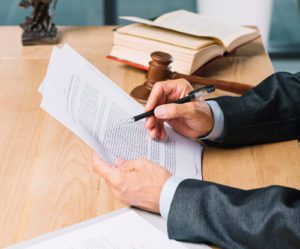 Justice Fernandez-Vina continued: The Fourth Amendment’s prohibition against unreasonable searches and seizures operates as a restraint only upon sovereign authority. State v. Scrotsky, 39 N.J. 410, 416 (1963). Thus, “where a private person steals or unlawfully takes possession of property from the premises of the owner and turns it over to the government, which did not participate in the taking, it may be used as incriminating evidence against the owner in a subsequent criminal prosecution.” Ibid. When a private person acts “as an arm of the police,” however, the private person’s seizure of property constitutes state action for purposes of the Fourth Amendment. Ibid. In Scrotsky, the landlady of an apartment building suspected that one of her tenants had been stealing personal effects from her home and entered the tenant’s apartment accompanied by a police detective. Id. at 413-14. The landlady “went into the apartment with the police and seized the property under color of their authority and as a participant in a police action.” Id. at 415. Therefore, the evidence seized by the landlady could not be introduced. Id. at 417-18.
Justice Fernandez-Vina continued: The Fourth Amendment’s prohibition against unreasonable searches and seizures operates as a restraint only upon sovereign authority. State v. Scrotsky, 39 N.J. 410, 416 (1963). Thus, “where a private person steals or unlawfully takes possession of property from the premises of the owner and turns it over to the government, which did not participate in the taking, it may be used as incriminating evidence against the owner in a subsequent criminal prosecution.” Ibid. When a private person acts “as an arm of the police,” however, the private person’s seizure of property constitutes state action for purposes of the Fourth Amendment. Ibid. In Scrotsky, the landlady of an apartment building suspected that one of her tenants had been stealing personal effects from her home and entered the tenant’s apartment accompanied by a police detective. Id. at 413-14. The landlady “went into the apartment with the police and seized the property under color of their authority and as a participant in a police action.” Id. at 415. Therefore, the evidence seized by the landlady could not be introduced. Id. at 417-18.
Here, defendant’s brother was clearly not acting as an agent of the State when he searched for the phone. Unlike in Scrotsky, defendant’s brother’s actions were completely independent of the officer’s investigation. The mere presence of an officer does not by itself indicate police coercion or influence, and no evidence in the record supports that defendant’s brother’s search was causally or temporally connected to the police misconduct. Defendant’s brother’s unprovoked decision to search for the phone himself is an intervening circumstance that breaks the causal connection between the unlawful police entry and the finding of the phone. The brother’s actions were voluntary and unsolicited by the police, and the phone is immune from the exclusionary rule. The judgment of the Appellate Division is modified and affirmed.
In dissent, Justice Albin noted that the State bears the burden of proving attenuation. According to Justice Albin, the State failed to show that the unlawful police occupation of the family home did not heavily influence the brother’s decision to fetch the phone and that, absent the unlawful police presence, the brother would have volunteered to look for the phone. The taint from the unconstitutional police occupation of defendant’s home was not purged by the brother’s cooperation with the police, in Justice Albin’s view.
Justice Fernandez-Vina’s citations to the “Fourth Amendment” give insight into his pro-police inclinations. Until he and the other Governor Christie-appointees were nominated to the New Jersey Supreme Court, our state had a rich history of citing to Article 1, paragraph 7 of the New jersey Constitution in providing citizens greater protections than those required by the fourth amendment.
